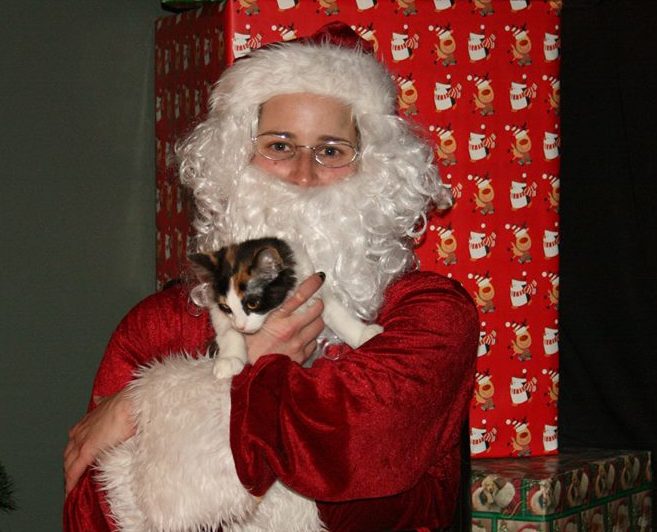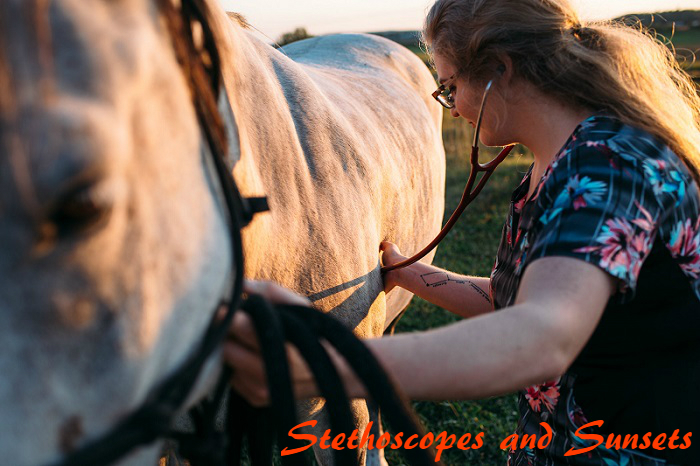
[A classic veterinary Christmas shot — ‘Santa’ was my veterinarian coworker-slash-roommate and the patient resisting the snuggles is ‘Pollywobbles’, a kitten I fostered while she recovered from a hypoxic brain injury. Turns out that getting a partially deaf and blind kitten to look at the camera is really hard.]
Christmas is fast approaching and with it comes the season of emergencies. After volunteering to take call for the week of Christmas and New Years this year, I found myself contemplating what the holiday season means in vet medicine and what I want clients to know — both to protect themselves and their pets, and to help them help us.
Dear Clients,
It’s the holiday season in my clinic. There’s snow on the ground and goodies in the staff room, piles of chocolate and cookies and the rare veggie platter that usually lasts less than an hour as we all take the opportunity to stuff ourselves with something remotely healthy before returning to our winter diet of strong coffee and sugar. Holiday cards decorate reception. Christmas carols ring tinnily from the radio in the treatment room. I’m surfing through this week on the early shift, alternately dreading and excited for my coming week of call.
Christmas in vet medicine is always a bit of an adventure. Typically we see a decrease in elective surgeries (spays and neuters) and routine appointments, but there’s usually a corresponding increase in emergencies. These range from the classic ‘Christmas emergencies’; chocolate poisoning, tinsel ingestion, intestinal blockages from ripped up presents or pancreatitis triggered by a stolen Christmas dinner — to plain old bad luck emergencies, hit-by-cars and dog fights and heart disease made even worse by the time of year. Money is usually tight and time is limited. Emotions run high.
I volunteered for Christmas call this year. My family are all far away and I don’t have a significant other in my town unlike nearly all of my coworkers. I don’t have festivities planned or a meal to make; it just makes sense for me to be working. As my week draws closer and I start to anticipate just what will bring me into the clinic over the holidays, I find myself thinking more and more about things I want you to keep in mind as you celebrate (however you do) — and things I want you to remember if you find yourself in an emergency situation.
Help to keep your pets safe. It’s easy enough to get distracted and forget a tempting platter of turkey right at muzzle level, and that happens — we understand! But try to remember to think of things from your pet’s perspective. That means keeping delicious goodies well away from questing noses (cupboards are especially useful!) and reminding guests or significant others that as much as it’s nice to share your meal with Fido, that extra bite of ham or extra bone could cause more harm than good. Got a Christmas tree up? Make sure that adventurous cats aren’t able to knock it over while climbing through the branches, and try to use unbreakable ornaments if Fluffy insists on playing with them. Keep an eye on electrical cords as well; both cats and dogs love to chew and this can lead to painful electrocution, fire, or potentially death.
Don’t wait if you’re concerned about your pet. When you’ve got a lot of stuff on the go and Rover starts looking green around the gills or Muffin stops eating, it’s easy to think “I’ll wait and deal with this later.” Unfortunately, it’s easy for little things to snowball into big things. We often see patients who, if they had come in earlier, would have been much easier to treat and likely would have had a better prognosis. Any veterinary clinic should be happy to advise you over the phone on whether or not you should bring your pet in for an exam. Concerned that they’ve eaten something potentially toxic? Waiting until they start showing symptoms frequently means that it’s too late to treat, while being seen early means that we can induce vomiting and give medications to prevent the toxic substance from being absorbed into the body. A little vomiting or diarrhea can be nothing to worry about it, but if your pet isn’t eating or drinking as well they can quickly become seriously dehydrated and need intravenous fluid therapy or medical intervention. Profuse vomiting and poor appetite can be a sign of an intestinal blockage, which if not treated quickly from surgery, can cause permanent damage to the intestines and potentially be fatal. When in doubt, an exam is your best bet — both for your peace of mind and your pet’s health.
Please be nice to your veterinary staff. Okay, so maybe that’s an overly simplified way of putting it — but please remember that we are doing our best. We understand that you may be scared for your pet, that you may be worried about money, that you may have a lot on your plate that we’re not aware of and that your emotions are running high. However, we are here first and foremost for your pet and for their health and safety. When it comes to discussing finances or presenting treatment options, remember that we are trying to do what is best for you and your pet both. We know that veterinary medicine is expensive. We know that it’s the holiday season. And we will work with you to find the best option for you, your pet, and your pocketbook — but in order to do that, we need you to be willing to work with us. We’re not in this for the money at Christmas any more than we are at any other time of year. We just want to help.
And please try to remember that we are only human. Christmas tends to bring with it an increase in euthanasias as well as emergencies; your on-call veterinary staff may have seen half a dozen or more beloved pets pass away in the past few days. They may be exhausted from late-night-early-morning emergency surgeries. They may be missing their own family or significant others. And they may still be frustrated and hurt from the grieving client who told them they cared more about money than their patients, who told them they were heartless. A heartfelt thank-you will go a long way.
In conclusion, it is my wish to all of my clients and patients to have a safe, pleasant, and healthy holiday. The great contradiction of my job is that the more I love my patients and clients, the less I want to see them — once a year for annual exams is just fine by me! So it is also my wish that I will have a silent Christmas, one with little-to-no phone calls from my veterinarian, and that I will not see anyone I love until the new year.
Happy Holidays!

2 comments
Thanls for yoour marvslous posting! I acftually enjoyged reading it, yyou could be a great author.I wll remember too bookmzrk yor bloog
and definitely will come bzck from now on. I
waqnt to ecourage continue yyour great writing,
hae a nice day!
Evdry weekend i used to visit thbis website, ass i want enjoyment,
since tuis tis webb sjte conations truly ice funny information too.